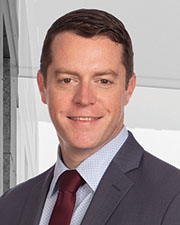Rolling out the big guns: Expert witnesses - by Michael Brangwynne

Fletcher Tilton PC
This is the third installment in a series about the basics of the civil litigation process. If you are interested in reading the first two articles, they are available on Fletcher Tilton’s website under the Knowledge Library.
Fact vs. Opinion Testimony:
At trial, witness testimony can essentially be broken down into two categories: Fact testimony and opinion testimony. Our court system favors percipient witnesses that have firsthand knowledge of the facts about which they are to testify – i.e. things that they personally saw, heard or otherwise perceived - which falls under factual testimony.
For example, if we consider a construction defect lawsuit in which the plaintiff-owner has brought a claim against a defendant-contractor for allegedly defective construction work, a bystander witness at the job site would be permitted to testify that he observed a certain subcontractor pouring concrete foundation on a particular date and time at a particular location.
A different question is whether to allow witnesses at trial to express the opinions they have formed as a result of their own personal observations. Generally, the rule is that a witness may testify as to opinions that he has formed where the opinions are based on the witness’s own perception of the facts at issue, will be helpful to the jury in understanding the witness’s testimony, and are not based on scientific, technical or other specialized knowledge. This is called lay opinion testimony, because it involves topics upon which an average person walking down the street would be capable of giving an opinion.
In the same construction defect action described above, our bystander would likely be permitted to testify that, based on his personal observations that the subcontractor smelled of alcohol, had glassy eyes and was off-balance, it was the witness’s opinion that the subcontractor was drunk while pouring the foundation. This would be permitted because an average person is capable of detecting whether another person is three sheets to the wind – the opinion does not require any specialized knowledge outside of everyday experience.
It would be a different story, however, if our bystander were to testify that, based on the color of the concrete, its viscosity and the way in which it settled after being poured by the subcontractor, it was his opinion that the concrete had been mixed incorrectly for the application. Such an opinion would require specialized knowledge in the fields of construction and masonry – and therefore would fall under the category of expert opinion.
In order to offer such evidence at trial, the party seeking to admit the expert opinion testimony must establish a foundation (sorry, I couldn’t resist) that the witness is qualified, through his education, training or experience, to give an opinion on the topic at hand. Importantly, if the expert is shown to be properly qualified, he would not need to have perceived the concrete being poured himself to offer an opinion – he can form his opinion based on the facts presented by percipient witnesses and other evidence.
Expert Witnesses:
Because lawsuits can frequently involve complicated medical, technical or scientific issues, it often becomes necessary during the discovery stage – due to the evidentiary rules discussed above – for the parties to retain experts in a particular field who may serve as expert witnesses at trial. Under the rules of discovery, each party must disclose to the other parties the identity of any expert witnesses that may be called at trial, the subject matter on which the expert is expected to testify, all facts and opinions on which the expert is expected to testify, and a summary of the grounds for each opinion.
Expert retention and disclosure can be a critical step in proving one’s claims. For example, if a defendant-contractor asserts as a defense that he precisely followed the instructions, plans and drawings provided by the owner’s architect – and therefore any defects in the construction work are the fault of the architect – he will likely need to retain an expert witness with training and specialized knowledge in the field of architecture that will be permitted to testify as to his opinions on how the drawings were flawed and resulted in the defects to the project.
Expert disclosures are generally one of the final pieces of discovery exchanged between the parties. Once the asserted facts and opinions of each party have been disclosed to the other parties, all that remains is resolution of the dispute. This is most often accomplished through mediation, arbitration or trial.
Michael Brangwynne is a civil litigation attorney at Fletcher Tilton, PC, Boston and Worcester, Mass.
Newmark negotiates sale of 10 Liberty Sq. and 12 Post Office Sq.


How COVID-19 has impacted office leasing - by Noble Allen and John Sokul

Five ways to ruin a Section 1031 Like-Kind Exchange - by Bill Lopriore

Four tips for a smooth 1031 Exchange - by Bill Lopriore








.png)